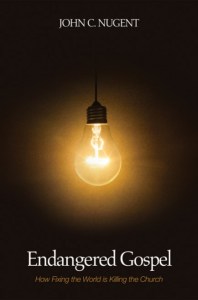 I know that I’ve left several very important questions unanswered. Before we get there, we need to consider one more of Nugent’s ideas: the significance of the powers to the modern church.
I know that I’ve left several very important questions unanswered. Before we get there, we need to consider one more of Nugent’s ideas: the significance of the powers to the modern church.
We’ve covered this topic here a couple of times, but it’s one that’s rarely preached or covered in Bible class, although it’s fairly prominent in the NT. For example,
(Eph. 6:11-12 ESV) 11 Put on the whole armor of God, that you may be able to stand against the schemes of the devil. 12 For we do not wrestle against flesh and blood, but against the rulers, against the authorities, against the cosmic powers over this present darkness, against the spiritual forces of evil in the heavenly places.
Paul plainly believes in spiritual rulers, authorities, powers, and forces that are opposed to the gospel. On the other hand,
(Col. 1:15-17 ESV) 15 He is the image of the invisible God, the firstborn of all creation. 16 For by him all things were created, in heaven and on earth, visible and invisible, whether thrones or dominions or rulers or authorities — all things were created through him and for him. 17 And he is before all things, and in him all things hold together.
While the powers are opposed to the gospel, they are also creations made by Jesus “for him.” They were made to serve Jesus’ own purposes. Therefore, Christians should submit to these authorities — Continue reading →
 Today’s lesson is a little short. Our early service ran late and cut off about 10 minutes of teaching time. I reviewed and summarized, took some questions, and tried to introduce the next couple of lessons on the impact of all this on mission.
Today’s lesson is a little short. Our early service ran late and cut off about 10 minutes of teaching time. I reviewed and summarized, took some questions, and tried to introduce the next couple of lessons on the impact of all this on mission.




